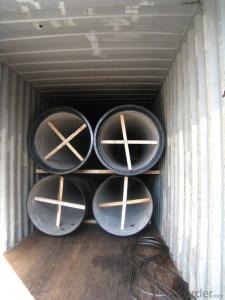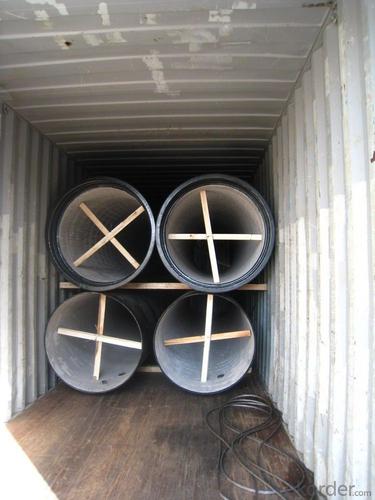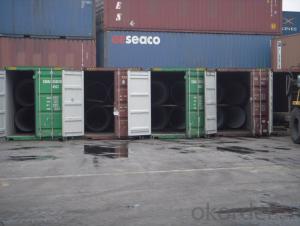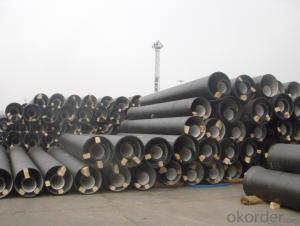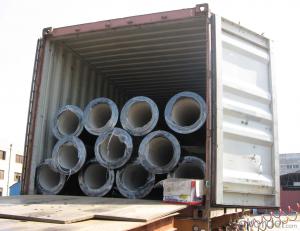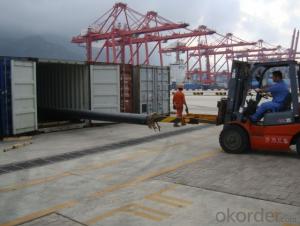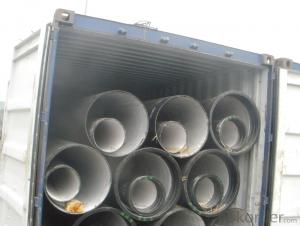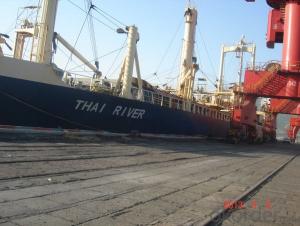DUCTILE IRON PIPE AND PIPE FITTINGS C CLASS DN1600
- Loading Port:
- Tianjin
- Payment Terms:
- TT OR LC
- Min Order Qty:
- 23 pc
- Supply Capability:
- 3000 pc/month
OKorder Service Pledge
OKorder Financial Service
You Might Also Like
· Material : Ductile Cast Iron
· Size Range : DN 80mm to DN 2000mm
· Unit Effective Length : 6m or 5.7m
· Manufacture Standard: ISO 2531:1998/ EN 545:2006/EN 598:2007
· Annual capacity : 200,000 tons
· Coating Exterior: Zinc 130g/m2 according to ISO 8179-1 and bitumen coating 70 microns.
· Cement Interior: Portland Cement/ High Alumina Cement/ Sulphate Resisting Cement Lining according to ISO 4179
· Special requirements on external coating and internal lining can be applied
· We also provide accessories such as SBR/EPDM rubber gaskets, lubricant paste, pipe caps, PE sleeves, etc.
Additional Parts:
Each pipe is strictly inspected according to related standard to ensure permanently high performance.
Easy Installation at site and service free for life
Long Service Lifespan
Quotation will arrive you within 24hours once we get your inquiry.
We guarantee offering you a competitive price.
A copy of original inspection reports of pipes will be offered after shipment.
Photos of loading process will be sent to the customer after shipment effect.
We will follow-up the delivery progress after shipment effect and update to the customer on weekly basis.
- Q: How do ductile iron pipes perform in acidic soil conditions?
- Ductile iron pipes perform well in acidic soil conditions due to their inherent corrosion resistance. The high carbon content and protective coating of ductile iron pipes make them less susceptible to corrosion from acidic substances in the soil, ensuring their durability and longevity.
- Q: Can ductile iron pipes be used for underground oil and gas pipelines?
- Yes, ductile iron pipes can be used for underground oil and gas pipelines. Ductile iron is a strong and durable material that can withstand the high pressure and corrosive nature of oil and gas transportation. It has excellent tensile strength and impact resistance, making it suitable for underground applications. Ductile iron pipes are also resistant to external loads, which is important for underground pipelines that may be subject to soil movement or heavy traffic. Furthermore, ductile iron pipes can be easily jointed, allowing for efficient installation and maintenance. However, it is important to consider factors such as soil conditions, environmental factors, and specific project requirements before choosing ductile iron pipes for underground oil and gas pipelines.
- Q: How does ductile iron pipe resist internal corrosion?
- Ductile iron pipe resists internal corrosion through a combination of its unique material properties and protective coatings. Firstly, ductile iron, also known as nodular cast iron, is made by adding magnesium to molten iron, which causes the graphite in the material to be nodular or spherical in shape. This results in a more flexible and elastic material compared to traditional cast iron, making it less prone to cracking or fracturing under stress. Additionally, ductile iron has a dense, microstructure with a high carbon content, which acts as a barrier to prevent corrosive elements from penetrating the pipe's surface. This inherent resistance to corrosion makes ductile iron pipe suitable for carrying various fluids such as water, sewage, and chemicals without the risk of degradation over time. Furthermore, ductile iron pipes are often internally lined with protective coatings to further enhance their resistance to corrosion. These coatings, such as cement mortar or epoxy, create a barrier between the pipe's surface and the fluid it carries, preventing direct contact and reducing the likelihood of corrosion. These linings are applied during the manufacturing process, ensuring a consistent and durable protection throughout the entire length of the pipe. In summary, ductile iron pipe resists internal corrosion due to its material composition, including the nodular graphite structure and high carbon content, as well as the application of protective coatings. This combination of factors ensures the longevity and reliability of ductile iron pipes in various applications, even in corrosive environments.
- Q: How long is the service life of the cast iron pipe, and the time of use of ductile iron pipes?
- Ductile iron is a new type of pipe, as long as we use it properly, the quality of its products, then the use of ductile iron pipes for 20-35 years, basically no problem. But whether it is ductile cast iron pipe, or some other things, the use of more years, and more or less, there will be some problems, ductile iron pipe can not escape the robbery. However, as long as we use the ductile iron pipe in the process of careful care, the service life of the problem is not to worry about.
- Q: What is the expected bending stress capacity of ductile iron pipes?
- The expected bending stress capacity of ductile iron pipes can vary depending on various factors such as the pipe's diameter, wall thickness, and the specific grade of ductile iron used. However, generally speaking, ductile iron pipes have a high bending stress capacity compared to other pipe materials. Ductile iron pipes are known for their high tensile strength and flexibility, making them capable of withstanding significant bending stresses. The exact bending stress capacity can be determined through rigorous testing and analysis by considering factors like the pipe's mechanical properties, dimensions, and the maximum allowable deflection. It is important to note that the bending stress capacity of ductile iron pipes should be evaluated in accordance with industry standards and guidelines. These may include standards such as the American Water Works Association (AWWA) C150 or International Organization for Standardization (ISO) 2531, which provide specifications and testing methods for ductile iron pipes. Ultimately, the expected bending stress capacity of ductile iron pipes is determined by several factors and should be assessed based on the specific requirements of the application, considering industry standards and guidelines for accurate and reliable results.
- Q: What is the difference between ductile iron and cast iron pipes?
- The main difference between ductile iron and cast iron pipes lies in their composition and properties. Ductile iron pipes are made from an alloy of iron, carbon, and silicon, which makes them more flexible and resistant to cracking. On the other hand, cast iron pipes are made from a mixture of iron, carbon, and other elements, which provides them with a higher resistance to corrosion and pressure. In summary, ductile iron pipes are more flexible and durable, while cast iron pipes are more resistant to corrosion and pressure.
- Q: Can ductile iron pipes be used in earthquake-prone areas?
- Yes, ductile iron pipes can be used in earthquake-prone areas. Ductile iron is a flexible and durable material that can withstand seismic activity and ground movements. It has been tested and proven to have high resistance against earthquakes, making it a suitable choice for infrastructure in earthquake-prone regions.
- Q: What is the maximum allowable deflection for ductile iron pipes?
- The maximum allowable deflection for ductile iron pipes is typically specified by industry standards and guidelines, such as those provided by the American Water Works Association (AWWA) and the Ductile Iron Pipe Research Association (DIPRA). These standards specify the maximum allowable deflection as a percentage of the pipe's outside diameter. According to AWWA C150/A21.50 and DIPRA's Technical Bulletin No. 10, the maximum allowable deflection for ductile iron pipes can vary depending on factors such as pipe size, wall thickness, and soil conditions. However, a common rule of thumb is that the maximum allowable deflection should not exceed 3% of the pipe's outside diameter. It is important to note that exceeding the maximum allowable deflection can result in potential structural issues and reduced performance of the ductile iron pipe. Therefore, it is crucial to adhere to the industry standards and guidelines to ensure the proper installation and functioning of ductile iron pipes.
- Q: How long do ductile iron pipes last?
- Ductile iron pipes possess an impressive durability and extended lifespan. Typically, these pipes can endure from 80 to 100 years, with certain instances even reaching an impressive 150 years. The exceptional longevity of ductile iron pipes can be attributed to their sturdy construction, enabling them to withstand high-pressure surroundings, combat corrosion, and endure severe weather conditions. Furthermore, ductile iron pipes have established a commendable reputation for their reliability and performance, rendering them a favored option for water and wastewater infrastructure projects worldwide. By conducting regular inspections and implementing maintenance measures, the lifespan of ductile iron pipes can be further prolonged, assuring their continued service for numerous decades to come.
- Q: Can ductile iron pipe be used for underground applications?
- Indeed, underground applications can employ ductile iron pipe. Renowned for its robustness and endurance, ductile iron pipe proves to be well-suited for a multitude of underground uses, including water and sewage systems, gas pipelines, and irrigation systems. Its exceptional resistance to corrosion and external burdens renders it a dependable selection for underground installations, where sustained functionality and structural soundness are pivotal considerations. Moreover, ductile iron pipe's pliability enables it to endure ground shifting and settling sans fracturing or shattering, making it an apt choice for regions susceptible to seismic occurrences.
Send your message to us
DUCTILE IRON PIPE AND PIPE FITTINGS C CLASS DN1600
- Loading Port:
- Tianjin
- Payment Terms:
- TT OR LC
- Min Order Qty:
- 23 pc
- Supply Capability:
- 3000 pc/month
OKorder Service Pledge
OKorder Financial Service
Similar products
Hot products
Hot Searches
Related keywords
